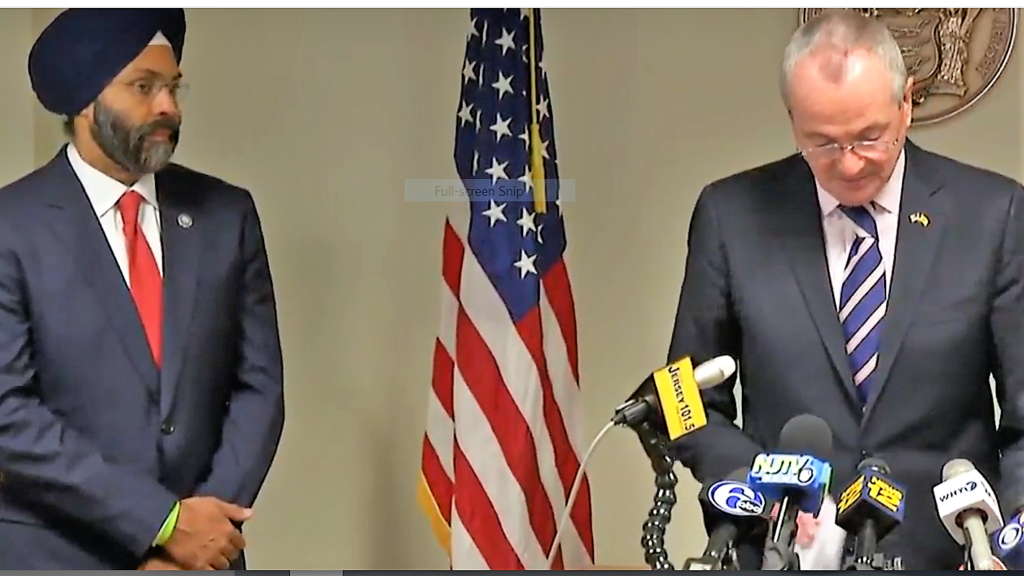AG Grewal Announces Working Group on Municipal Court Prosecutions of Marijuana Offenses and Other Crimes

AG Grewal Announces Working Group on Municipal Court Prosecutions of Marijuana Offenses and Other Crimes
Working Group Will Advise AG on the Proper Role of Municipal Prosecutors
TRENTON – Attorney General Gurbir S. Grewal today named the members of a working group of criminal justice stakeholders that will review the scope and appropriate use of prosecutorial discretion in marijuana-related and other offenses in municipal court, as well as other issues relating to the role of municipal prosecutors.
The 20-member working group will represent prosecutors from the state, county, and municipal levels; defense attorneys; police; civil rights organizations; and other community leaders. This broad spectrum of stakeholders reflects the collaborative approach that Attorney General Grewal has taken with respect to all policy initiatives he has spearheaded during his tenure.
The Attorney General first announced that he would convene a working group to study and advise him on the scope of municipal prosecutors’ discretionary authority in a letter issued earlier this week. The Attorney General will consider the working group’s advice when he prepares a directive—expected in August—that will provide guidance about the scope and appropriate use of prosecutorial discretion in marijuana-related cases in municipal court.
In creating the working group, the Attorney General is taking action to respond to recent developments that raise concerns about quality of justice being administered in New Jersey’s municipal courts. First, last week, a New Jersey Supreme Court committee released a report that makes a series of recommendations for policy changes and legislative proposals aimed at promoting the fair administration of justice in municipal courts. Also last week, the Attorney General issued a letter addressing the proper scope of municipal prosecutors’ discretion in marijuana-related cases and invalidating a memorandum issued by a municipal prosecutor who purported to decriminalize marijuana.
“I look forward to hearing from this working group about how we can improve the equal, impartial, and uniform administration of justice in our municipal courts,” said Attorney General Grewal. “Every day, my Department works with criminal justice stakeholders to build trust between law enforcement and the communities they serve. This working group will review how the municipal prosecutors under my supervision can contribute responsibly to the progressive solutions we are seeking.”
“Chief Justice Rabner has called on New Jersey’s municipal courts to adhere to the Judiciary’s high standards of integrity, independence, and fairness, without regard to any outside pressures,” Attorney General Grewal noted. “The working group that we are establishing today will kick start a parallel review of the scope and appropriate use of prosecutorial discretion in municipal court, including in prosecutions of marijuana offenses.”
The members of the new working group will include:
Veronica Allende, Director of the Division of Criminal Justice within the Department of Law and Public Safety, who will chair working group;
Matthew Berns, Counsel to the Attorney General;
Richard T. Burke, Warren County Prosecutor;
Pat Colligan, President of the New Jersey State Policemen’s Benevolent Association;
Claudia DeMitro, Deputy Attorney General, Department of Law and Public Safety, Division of Criminal Justice;
Annette DePalma, President of the New Jersey State Municipal Prosecutors’ Association;
Stephan Finkel, Director of Legislative Affairs for the Department of Law and Public Safety;
Charles Fiore, Gloucester County Prosecutor;
W. Reed Gusciora, Mayor of Trenton;
Jake Hudnut, Chief Municipal Prosecutor for the City of Jersey City;
Van Lane, Deputy Public Defender for the Monmouth Trial Region;
Robyn B. Mitchell, Deputy Attorney General, Department of Law and Public Safety, Division of Criminal Justice;
Jiles H. Ship, New Jersey Police Training Commissioner and Past President of the National Organization of Black Law Enforcement Executives (NOBLE) and
Commissioner of the Law Enforcement Action Partnership (LEAP);
Ahmad Rasool, Municipal Prosecutor for the City of Newark (or a designee);
Amol Sinha, Executive Director of the ACLU of New Jersey (or a designee);
Richard T. Smith, President of the New Jersey State Conference of the NAACP;
Steven A. Somogyi, Assistant Director for the Municipal Court Services Division of the New Jersey Judiciary;
Sherry Stembridge, Assistant Essex County Prosecutor;
Esther Suarez, Hudson County Prosecutor;
John Zebrowski, Chief of Police, Sayreville Police Department.
The working group may offer recommendations to the Attorney General on issues including the proper scope of municipal prosecutors’ discretionary authority, in general and with regard to marijuana offenses in particular; the manner in which chief municipal prosecutors exercise their authority over other municipal prosecutors, subject to the supervisory authority of the county prosecutors and Attorney General; and the ethics, integrity, and independence of municipal prosecutors from improper outside influence.
Earlier this week, Attorney General Grewal asked all municipal prosecutors in New Jersey to pause marijuana-related prosecutions in municipal court until September 4, 2018, while the Office of the Attorney General solicits advice from the working group and develops statewide guidance. The Attorney General’s directive from earlier this week does not affect law enforcement officers’ authority to make marijuana-related arrests or County Prosecutors’ authority to prosecute marijuana-related offenses in Superior Court. The Attorney General’s forthcoming directive will address how marijuana-related prosecutions may proceed in municipal court after September 4, 2018.
While the working group will advise the Attorney General on municipal court prosecutions of marijuana-related offenses—in time for the Attorney General to issue his directive in August—the working group may offer advice on other topics, to inform longer-term, progressive reforms concerning the role of municipal prosecutors.





